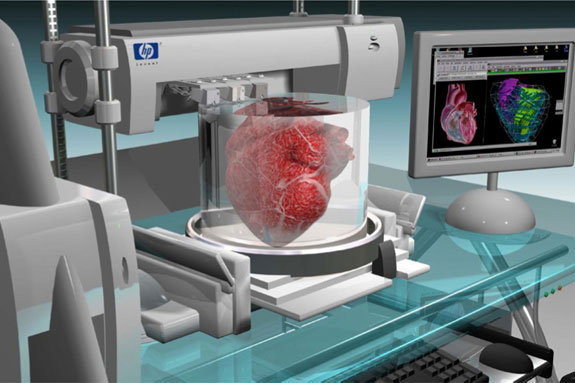What is it?
A relatively new offshoot of 3D printing, Bio-Printing involves the use special printers, inks and paper to create living 3D replicas of human tissue. Where 3D printers print inanimate (and sometimes edible) objects using materials like plastic, metal, rubber granulated sugars, Bio-Printers use ‘Bio-Ink’ a liquid mix made from living cells to create things like blood vessels, skin cells, noses ears, and hopefully in the near future, fully functioning livers, lungs and hearts.
The Printing Process
First an image of the tissue to be printed must be created. Using software similar to AutoCAD, a 3D blueprint of the tissue is made and fed into a printer. Ink containing biopolymer solutions are fed into a printer’s ink jet and the print job is started. Bio-Print jobs are created by continuously layering cells at varying temperatures on Bio-Paper (special paper created to keep printed cells alive).
Why is it important?
For people on the bottom of the transplant waiting list, Bio-Printing is the light at the end of an otherwise dark tunnel. Through Bio-Printing, Doctors would have an endless supply of organs to transplant without the worry of transmitting diseases, or transplanting incompatible organs. People born with missing or damaged organs or limbs could have a new one created based on Bio-Ink created from their cells. From a cosmetic point of view, with research, Bio-Printing would allow people to have their entire faces printed. Eliminating the possibility of botched surgeries and greatly reducing the risks of plastic surgery.
Ethical Issues
There are mixed opinions on the ethics of Bio-Printing. The “Complex Heterogeneous Tissue Constructs Containing Multiple Cell Types Prepared By Inkjet Printing Technology” study combined both human and animal cells to create living tissue. While the majority of the public was not (and still isn’t) aware of the human cross animal tissue, it started a heated ethical & moral debate. Some of the tissues used in Bio-Ink come from stem cells – making the use of the ink highly controversial. The Catholic Church prohibits the use of stem cells that originate from human embryos; however, this prohibition does not extend to all stem cells. A two year old born without a windpipe, had an artificial one created for her from stem cells taken from her bone marrow.
Bio-Printing has the potential to revolutionize the medical community. It can save lives that would have otherwise been forfeit, but it will eventually force people to deal with serious ethical issues. Bio-Printing has not yet reached the level of being able to create fully functioning organs, but the technology improves by leaps and bounds every day. Should a person accept a liver that will save their lives if it contains the cells of say, a pig? Should an infant be allowed to die because their only option is to be given a heart printed from embryotic stem cells? When we eventually perfect this potentially lifesaving technology, what will we do with it?
Sources
http://www.engineering.com/3DPrinting/3DPrintingArticles/ArticleID/6585/Gelatin-Bio-Ink-Could-Lead-to-3D-Printed-Organs.aspx
http://www.engineering.com/3DPrinting/3DPrintingArticles/ArticleID/4969/The-Status-of-Bio-Printing.aspx
http://www.wisegeek.com/what-is-bio-ink.htm
http://pubs.rsc.org/en/content/articlelanding/2013/bm/c3bm00012e#!divAbstract
http://now.uiowa.edu/2013/02/ui-researchers-developing-3d-printer-bio-ink-create-human-organs
http://www.technewsworld.com/story/80198.html
http://www.technewsworld.com/story/80205.html?rss=1
http://www.techradar.com/us/news/computing-components/printers-and-scanners/report-says-3d-bioprinting-will-spark-debate-on-ethics-1219739
http://www.techradar.com/us/news/computing-components/printers-and-scanners/report-says-3d-bioprinting-will-spark-debate-on-ethics-1219739
http://www.3dprinterworld.com/article/chinese-researchers-invent-regenovo-bioprinter
http://www.explainingthefuture.com/bioprinting.html
http://news.msn.com/obits/2-year-old-with-windpipe-made-from-stem-cell-dies
Image Credits
http://3dprintedorgans.com/wp-content/uploads/2013/10/Bioprinting.jpg




